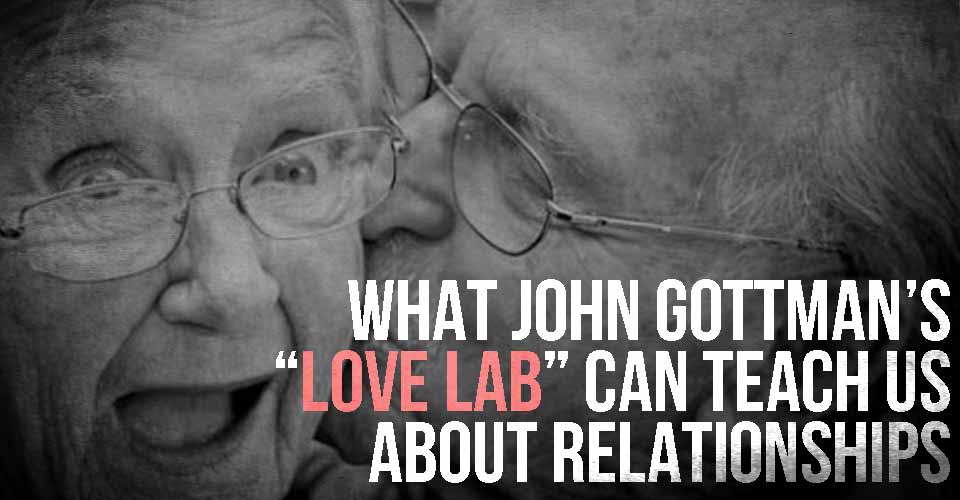
back in the 1970’s, divorce rates started to skyrocket at a rate that had never been seen before. The concern at the time was the impact that these divorce rates would have on the children associated with the divorces, so psychologist began studying marriages in an attempt to see why they were failing. There were a lot of questions about the individual aspects of each marriage being the cause for divorce, or whether or not these marriages had something in common. That’s what lead to psychologist John Gottman setting up what he affectionately calls the “love lab” in 1986 with fellow psychologist Robert Levenson at the University of Washington.
Buy an “Intelligence is sexy” t-shirt!
Masters and Disasters
The “love lab” was a place where Gottman and Levenson could watch newlywed couples interact and study their responses to one another. In one such study, newlyweds were hooked up to electrodes to monitor certain aspects of their physiology like blood pressure, heart rate, and sweat production. Not unlike a lie detector, basically. The couples were then asked questions about their relationships like how they met, conflicts, and positive memories. Through this analysis, Gottman was able to break the couples into two groups: masters and disasters.
The disasters appeared calm, but their physiology was a much different story. They all had increased heart rates, higher sweat production, and higher blood pressure. In essence, they were in a constant state of “fight or flight” mode throughout the interview. The masters, on the other hand, showed a very low physiological response, if any. What is interesting about this study was not only that the disasters had a much higher rate of divorce, but the more physiologically active they were – the sooner they got divorced. It almost seemed as though Gottman could predict divorce. Basically, the disasters were in a constant state of agitation while simply having a conversation with their spouse, whether they showed it or not. But why? Gottman believes that the phenomenon boiled down to kindness over criticism.
The Effect of “Bids”
In another study in 1990, Gottman set the lab up to look like a bed and breakfast, and filmed couples going about routine days together. He noticed that throughout the day one or more of the partners would open up an avenue for interaction that he called a “bids”. For example, a partner would say something like “oh, did you see this story on the news?” which creates an opportunity for engagement. The other partner has the opportunity to “turn toward” or “turn away” from the bid by either engaging or ignoring it. If the partner replied “no, what was it?”, that would be an instance of “turning toward” a bid, while replying something negative would be “turning away”.
In the end, the scenario isn’t about whatever the partner is offering up as a bid, it is how often the other partner “turns toward” a bid. Based on that simple principle, Gottman found that couples who had more “turn away” responses to bids had a much higher rate of divorce. In fact, after all these years of research, Gottman can predict whether couples — straight or gay, rich or poor, childless or not — will still be together and happy several years later with about 94% accuracy.
Gottman explains, “There’s a habit of mind that the masters have, which is this: they are scanning the social environment for things they can appreciate and say thank you for. They are building this culture of respect and appreciation very purposefully. Disasters are scanning the social environment for partners’ mistakes.” His wife, Julie, went on to add, “It’s not just scanning the environment, it’s scanning the partner for what the partner is doing right or scanning him for what he’s doing wrong and criticizing versus respecting him and expressing appreciation.”
Read: Are You ‘In Love’ Or Just Attached? The Difference Is Important
So in conclusion, Gottman’s “love lab” shows that the spirit of kindness, above all else, is the key to a lasting relationship. Constantly searching for criticism develops contempt on both sides. Contempt alone is enough to ruin any relationship. Gottman found that people who are constantly looking for negative things in their partner miss at least 50% of the positive things that their partner does. In fact, the partners that search for negative things often find them when they aren’t really there. Julie Gottman described how kindness in relationships works by saying, “If your partner expresses a need and you are tired, stressed, or distracted, then the generous spirit comes in when a partner makes a bid, and you still turn toward your partner.”
Keep that generous spirit in mind. It is the key to a long-lasting, loving relationship.


